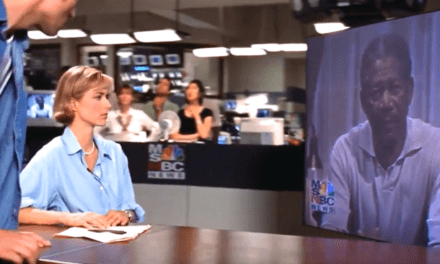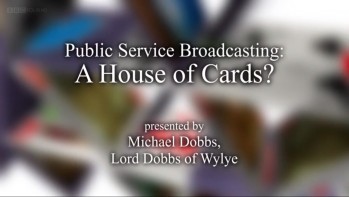In a recent CST blog, I discussed some of the negative issues surrounding the use of a fictitious country in the context of a series which also features both actual countries and attempts of sociocultural and/or sociopolitical critique. For this blog [1], I would like to provide a counterpoint with an example of how the use of a fictitious country can be done in a way that is more nuanced, if not necessarily more positive. As with all representations, it is imperfect; nevertheless it merits examination, particularly as it’s been largely overlooked. The example I’d like to discuss with you all today is the short-lived but still (in my view anyway) timely and timeless BBC series Ambassadors (2013).[2]
For those who missed the series in its three-episode run, it follows the new British Ambassador to the fictitious post-Soviet country ‘Tazbekistan’[3]: Keith Davis (David Mitchell), his deputy head of mission/long-term resident Neil Tilly (Robert Webb) and their various members of staff Caitlin (Susan Lynch), Isabel (Amara Karan), Natalia (Shivani Ghai) and Sergei (Andy Lucas). It is a comedy-drama, allowing both Mitchell and Webb to showcase their dramatic talents as well as allowing the series to engage in satirical critique, to which I shall return. Rounding out the cast is Davis’s cardiologist wife, Dr Jennifer Davis (the woefully under-used Keeley Hawes), who works at a local hospital, and the ambassador’s terrifying Foreign Office boss who appears only on a video conference screen and is referred to as the ‘Prince of Darkness’ or POD (the woefully under-used Matthew Macfadyen).[4] Over the course of the three episodes, the characters deal with various personal and political crises, including incarcerated British nationals, a Royal visit, dissidents claiming asylum and a coup attempt in the country.
My bringing up Ambassadors and using it as a counterpoint to my previous blog on House raises the question of whether or not postcolonial states are comparable to post-Soviet states. Moore (2006) explicitly argues that they are, critiquing what he calls the ‘too narrow Western postcolonial and too parochial post-Soviet studies’ (Moore 2006: 13). Spivak, in a letter quoted in Spivak et al (2006: 828), states in response to such questions by the Slavic Department at Columbia that ‘[w]hen an alien nation-state establishes it-self as ruler, impressing its own laws and systems of education and rearranging the mode of production for its own economic benefit, “colonizer” and “colonized” can be used.’ Condee (2006: 830), in direct response to Spivak, argues for a more nuanced response of ‘…we are left as yet with an affirmative, but still deeply unsatisfying, answer. If we have in mind the internal Soviet empire, the former fifteen republics, then the initial answer, again, is yes. But, of course, as soon as things begin to seem simple, the empire’s radical internal diversity makes this monosyllabic answer problematic…’ Lazarus (2012) argues that both postcolonial and post-Soviet studies have ‘a tendency to cast colonialism as a political dispensation and to refer it, in civilizational terms, to “the west” (or, in some versions, “the north”), rather than to the specific dynamics of capitalist development’ (2012: 120) and calls for a more nuanced understanding of how both essentialist/colonialist thought and the role of capitalism play into both fields. More recently, Tlostanova (2022) has taken Spivak’s note that ‘[e]very postcoloniality is situated, and therefore different’ (2006: 828; cf Hall 1995) and studies how the anticolonial/decolonial trajectories of post-Soviet states ‘intersect with and diverge from the predominantly Anglophone and Francophone postcolonial conceptual and theoretical frames and what role is played in this configuration by the state socialist form of coloniality’ (2022: 995). Thus, though keeping Lazarus’ criticisms in mind as well as the necessary specificity with regard to postcolonial and post-Soviet nations being differently postcolonial or post-Soviet, it seems fair enough for the purposes of this blog to think of a fictitious post-Soviet state as being comparable to a fictitious postcolonial state when said fictitious state is interacting with an actual state.
The second thing to address is genre. House was a generic blend of medical and crime drama which, as I argued in the earlier blog, is redolent of postcolonial crime fiction. Ambassadors, on the other hand, was a satirical comedy-drama which explicitly deals with British civil servants working abroad and the problems they face. That genre of course lends itself more easily to sociocultural or sociopolitical critique, so it is perhaps unsurprising that is exactly what is done, though like postcolonial crime fiction the characters are liminal and they are also spaces of negotiation (Bhabba 1994; Christian 2001). But the target of the critique is split between British foreign policy, the actions of individual Brits abroad, and the sociopolitical milieu of Tazbekistan. While this can be read as having some of the same issues as what was done with House, there is a clear attempt at nuance in all of these areas. Though there is not enough wordcount available here to discuss this fully and, as the series was so short, its ability for worldbuilding was very limited, there are representative scenes which illustrate the sort of critique the series tried to engage in. These include the ambassador shouting at both an actor who has assaulted Natalia, a local member of staff, and a human rights activist who antagonised the regime. While the chastisement of the actor is obvious enough, the point he makes to the activist is that, by ignoring consular advice he has made it harder for official British government personnel to try and change things such as human rights for the better. ‘You have no idea what we’re trying to achieve on a wider scale here!’ he tells the activist. This illustrates the public/private negotiations which the characters deal with in both personal and professional realms, including when their personal beliefs conflict with their professional obligations, providing a level of both detail and depth for the characters. It also provides a simultaneous subversion and explanation for some aspects of foreign policy on the ground, something which pervades the remaining episodes.
The backdrop to this episode features both a cultural visit– the actor coming to put on a performance and using the trip for what Davis describes as sex tourism– and geopolitical security pressures as POD tasks Davis with ensuring the British win a lucrative arms deal which will improve relations between the UK and Tazbekistan. This deal would cause the French to retaliate but would give the UK an oil-rich Muslim-majority ally in a region diegetically described as ‘the future’ and would bring a factory (and jobs) into the PM’s constituency. Davis explicitly states that his concern is for his country, not himself: ‘Why should British factory workers suffer because of one self-important idealist?!’ he demands to know. ‘Prosperity and security. Those are the priorities. We don’t make the policies.’ Neil then states that ‘On this particular occasion, you’re prioritising Britain’s commercial interests ahead of human rights, and our anti-death penalty campaign because you think the arms contract will do more good.’ Davis vehemently replies that ‘Yes I do. That’s right. Because it will do more good.’ Though the deal was ultimately lost to the French because Davis takes the moral approach and spends his brief time with the dictator negotiating the release of the human rights activist instead, the series presents multiple character perspectives which encompass macroscale geopolitics, mesoscale cultural and subcultural issues as well as microscale personal and interpersonal dynamics, all of which intertwine and none of which are easily reconciled or dismissed.
A similar moral twister occurs in episode two, in which a dissident is given asylum by Neil when Davis was unavailable. This is also when a British oil company was trying to land a contract with the Tazbek government. POD says that the Tazbek government would get the dissident back eventually, so that all Davis and Neil had done was to delay the inevitable as well as lose the oil contract. Davis briefly agrees, but the situation is unexpectedly resolved as the Tazbek government actually wanted to get rid of the dissident and, as Neil had realised, the bellicosity was for show. The episode also features a Royal visit from (fictional) Prince Mark (Tom Hollander) who, though superficially a narcissistic twit, is a skilled trade envoy who not only engages with the dissident but is able to arrange for him to be given a place at Warwick University studying a masters in international law while also getting the oil extraction deal for a British company. More importantly, however, he was able to engage one-on-one with the Tazbek dictator Karzak (Igal Naor) through first telling him publicly what he wants to hear through strongly-worded rhetoric (similarly to Karzak’s usual mode) and then privately by discussing problems in the country with Karzak. It illustrates the nuances involved in geopolitical wranglings as well as the public/private divide discussed above. This scene between these two powerful men, as they watch an episode of Last of the Summer Wine (BBC, 1973-2010) also gives both of them a moment of humanity, in which the dictator acknowledges and most importantly empathises with a human rights problem involving child labour. The conversation, which is followed up by Karzak banning child labour in cotton fields, in essence, humanises what could otherwise be cartoonish caricatures of a privileged British royal and a Central Asian ‘strongman.’
I could go on at length about the series and its portrayal of the negotiations required of a former colonial power attempting to both give benefit(s) to and to benefit from a post-Soviet state, but instead I would like to note that what is striking about all of the characters, British and Tazbek, is that they are not caricatures. They are given understandable and defensible perspectives and moments of humanity to increase their depth. Yes, the series cherry-picks both British foreign policy and the policies of post-Soviet states. But in doing so it allows for a critique of both from multiple perspectives, including that of public versus private negotiation and communication. In essence, the series is heteroglossic in Bakhtin’s sense (Bailey 2015), with different characters providing different, reasonable perspectives on their situations rather than a very flattened, reductive scenario in which explicitly colonialist tropes are the primary markers of the fictitious ‘culture.’ That the series takes place abroad allows for the audience to see a wider range of people and perspectives and many of the local characters can quite literally speak for their cultures as that is their explicit job in the Embassy (Spivak 1988; Christian 2001). While there is still an issue with the production team being primarily British-led and the imagining of a subaltern group (though differently subaltern to that seen in House), the subaltern characters are positioned as people dealing with sociocultural and sociopolitical pressures (e.g., Neil’s local girlfriend who is involved with the coup) in the same way as the British characters are, not as plot devices present only to help advance the lead/nonsubaltern characters’ arc(s) (contra Christian 2001).
The series is, I acknowledge, imperfect. There are a handful of French and (post-)Soviet stereotypes that crop up in places, though these tend to be divested from race or subalternity, and three episodes are not really enough to develop a fictitious cultural or political landscape beyond borrowing from existing ones. While both Ambassadors and House address human rights and other moral issues and both do focus upon British and Australian characters respectively, the difference is that Ambassadors is showing a process of integration within its fictitious culture and tries to explicitly engage with and critique the various nuances of foreign policy rather than a plot device to begin a character arc. The fundamental point of the series is about learning about another culture and trying to communicate to benefit everyone involved. That includes missteps, misunderstandings, debates about morals and obligations to both one’s country and to humanity, but more than anything, it sees everyone involved as human beings. Those who are positioned as antagonists are understandable and recognisable and, though positioned as being in the wrong they are not positioned as monsters. Both the British and Tazbek characters, though shown to be foreign to one another, are not Othered. And British foreign policy, though often shown to be morally questionable, is critiqued through this lens of nuance and of humanity for all the characters. As such, the series illustrates the potential benefits of the use of a fictitious country rather than the potential detriments.
Dr Melissa Beattie is a recovering Classicist who was awarded a PhD in Theatre, Film and TV Studies from Aberystwyth University where she studied Torchwood and national identity through fan/audience research as well as textual analysis. She has published and presented several papers relating to transnational television, audience research and/or national identity. She is currently an Assistant Professor of Communication (Ambassador’s Distinguished Scholars Programme Fellow) at Bahir Dar University in Ethiopia and will be joining the American University of Phnom Penh in August 2023 as an Assistant Professor of English/Humanities. She has previously worked at universities in the US, Korea, Pakistan and Armenia. She can be contacted at tritogeneia@aol.com.
Footnotes
[1] In the interest of full disclosure, I have lived and worked in several postcolonial and/or post-Soviet and/or developing countries. I am currently in Ethiopia on a joint partnership programme run by IIE (the Fulbright people), the US State Department and various Ethiopian partner universities which is called the ‘Ambassador’s Distinguished Scholars Programme.’ Though I am not a civil servant I have met the US Ambassador and her staff (they’re lovely) and the ambassador explicitly told a group of us at an Embassy reception that her posting to Ethiopia was a direct result of having worked in a post-Soviet, developing Central Asian country. This all informs my interpretation.
[2] The series is available on Amazon Freevee in the US, though I am uncertain where or if it streams elsewhere. In the UK, if you have access to BOB, the series is available there, or via Amazon Prime.
[3] The series was filmed partly in Bursa, Türkiye. The Turks and Central Asian peoples have a complicated though interrelated history.
[4] It is stated at the end of series one that POD would have travelled to Tazbekistan in person at some point during the sadly unproduced series two.
Works Cited
Bailey, B. (2015). ‘Heteroglossia,’ in The Routledge Handbook of Multilingualism. Edited by Marilyn Martin-Jones, Adrian Blackledge and Angela Crees. London: Routledge (epub), n.p.
Bhabba, H.K. (1994) The Location of Culture, London: Routledge.
Christian, E. (2001) Introducing the Post-Colonial Detective: Putting Marginality to Work. In Christian, E. (ed) The Post-Colonial Detective. Houndmills: Palgrave Macmillan, pp. 1-16.
Hall, S. (1995) ‘When was the post-colonial?’ [online] available from http://readingtheperiphery.org/hall/ . (accessed 20/11/22).
Lazarus, N. (2012) ‘Spectres haunting: Postcommunism and postcolonialism,’ Journal of Postcolonial Writing, 48:2, 117-129. https://doi.org/10.1080/17449855.2012.658243.
Moore, D. C. (2006) ‘Is the Post- in Postcolonial the Post- in Post-Soviet? Towards a Global Postcolonial Critique,’ in Baltic Postcolonialism, Edited by Violeta Kelertas. Amsterdam: Rodopi, pp. 11-44.
Spivak, G. C. (1988) ‘Can the subaltern speak?’ In Nelson, C. and Grossberg, L. (eds), Marxism and the Interpretation of Culture. Champaign: University of Illinois Press, pp. 271–313.
Spivak, G. C. et al. (2006) ‘Are We Postcolonial? Post-Soviet Space,’ PMLA 121: 3, pp. 828-836. https://jstor.org/stable/25486358.
Tlostanova, Madina (2022) ‘Discordant Trajectories of the (Post-)Soviet (Post)Colonial Aesthetics,’ Interventions, 24:7, 995-1010. https://doi.org/10.1080/1369801X.2022.2054003.






Goodness! That’s timely! Just the other day, my wife and I were driving down to an archive TV screening event when we said: “Hey! Do you remember that thing with Mitchell and Webb in it where they were ambassadors? What on earth was it called?” And – hey presto! – there we go. Instant answer…
… and an interesting too! Thanks Melissa! 🙂
All the best
Andrew
My pleasure! I’m glad to have helped and I’m glad you enjoyed the blog! 🙂 I hope the archive screening event was fun as well. 🙂